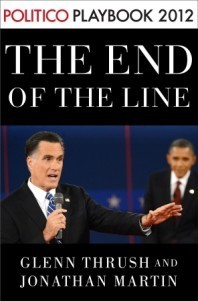What do you think?
Rate this book


78 pages, Kindle Edition
First published January 1, 2012
It was more than an hour after the networks had called the election, and Mitt Romney had not addressed the media or made the traditional concession phone call to the winner. David Axelrod and Valerie Jarrett were agitated. Obama’s campaign manager called the Romney campaign manager and got his voice mail. “He’ll call,” Obama told his team. Finally, at 12:30 a.m., after much of America had seen the outcome and gone to bed, Obama’s phone rang. “Hello, Mr. President, it’s Mitt Romney...”
Two forces of nature, Hurricanes Isaac and Stuart, shredded that script.
Stevens and Romney were also the prime movers behind the biggest unnatural disaster in Tampa, the decision to give Clint Eastwood a prime-time slot on the third and final night of the convention, according to people close to the campaign.
“We sent him a script and some talking points, and basically what we wanted him to perform was his ‘Halftime in America’ spiel...That’s what we expected him to do. And he showed up without any notes, nothing for the teleprompter, and he asked for a chair, and he was given a chair.”
The campaign had to be careful about putting [Romney] in regular-guy situations—the staple “off the record” visits at diners and hardware stores—because of his tendency to say weird, off-putting things.
“He should have said there was the Bush way and the Obama way, and neither of them worked—here’s the Romney way … It would have required him to totally change his philosophy—but, hey, that never stopped Mitt Romney.”
Romney’s pollster, was confident his GOP-friendly model of the 2012 electorate—falling somewhere between Bush’s 2004 reelection and the 2010 midterms—was the accurate one.